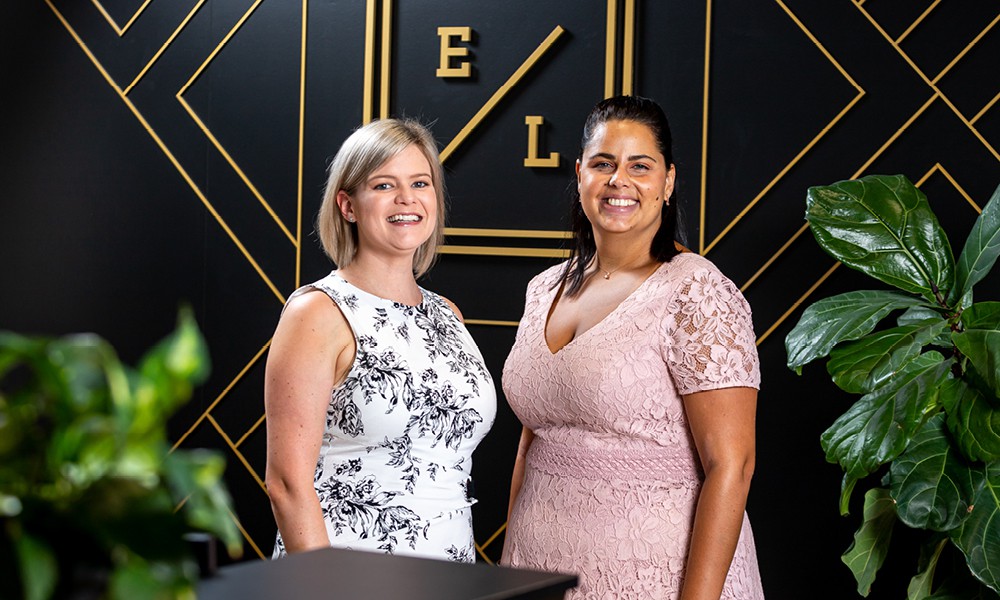“When the pandemic hit and we had to work remotely, collaboratively and do it quickly, it forced us not only to review our tech stack but also whether we were using it to its full capacity.
I remember reading a headline at the time encouraging us all to love the tech you’re with! We did and the big tech winners have been Office 365 and Zoom.
But for many, it also created a time and space to think about our practices differently. Could we be more agile, purposeful, and client centric? Should we be analysing data to help us figure out how to do things differently? The pandemic became a catalyst for building back better!”
Terri Mottershead, Executive Director of the Centre for Legal Innovation at The College of Law, Chair of Queensland Law Society’s Innovation Committee, and recently appointed as a member of the Corporate Legal Operations Consortium (CLOC) global Education Advisory Council, has a national and international profile for helping lawyers and allied professionals navigate change.
What you get with Terri is a deep understanding of the global legal marketplace, an ability to identify how the market is changing, and a laser focus on how the legal profession can add value in that process and to its outcome.
Terri has a realistic attitude about technology, seeing it as an enabler to change and urging tech vendors and lawyers to collaborate to build tech that is user friendly, works on everything and is jargon neutral!
Terri shared her thoughts on the dynamic changes being experienced in the legal industry in a recent conversation with me.
Terri Mottershead
Choosing to continue to adapt or to revert?
“Standing 40,000 metres above all the recent change in the legal marketplace, we are now starting to see the longer-term impacts of COVID.
In the short term we saw the legal industry change quickly, effectively, continue to adapt and support clients throughout the pandemic. But what we are looking at right now, is whether or not that change will be a blip on the status quo radar screen or, sustained.
No matter what we do, the market won’t stand still. If we don’t continue to change, my concern is that the legal profession will become the outlier – out of date and not relevant – others will continue to step in and pick up the competitive advantage if we decline to step up and consequently decide to step out.
Loving the tech you’re with!
When we all had to leave our offices and move home, the main communication tools that many of us had were Office 365 and Zoom. And that was enough to do a lot. We just didn’t realise the capability of what we had.
We’d had Office 356 for years and many of us only used email, Outlook, Word and a few more, PowerPoint and Excel. What about One Note, One Drive, Teams and all the apps for things like project/task management and analytics?
COVID forced us to see what was right in front of us and learn how to use it quickly, especially Teams! We may not have become tech gurus, but we definitely jumped a long way ahead in the application and use of our tech.
Remote and hybrid working
COVID also provided a global proof of concept that remote working is possible, people can be productive when working from home, and they can communicate from different places using technology. But we also learnt that people need to see each other in person from time to time too!
COVID changed the whole conversation about ‘where’ we work to ‘when, how and why we work’. It forced us to re-evaluate and better understand the importance of social contact and its impact on mental health and well-being.
Remote working may have been born out of necessity, but has led to a different hybrid workplace, different workspaces, and a permanent change to our workforce profile and BAU.
We’ve all still got a way to go in working through all the work alternatives and best practices. With that in mind, the Queensland Law Society’s Innovation Committee set up a working group to look at hybrid work – what it is and how this can be done successfully.
Richard Gardiner, Kim Trajer, and Sarah Grace have been leading this project. The working group will release a series of practical checklists shortly and they’ll be made available to QLS members. These checklists will provide an excellent resource to support conversations and help firms develop their best practices in this area.
Digital literacy
Digital literacy for lawyers has become a necessity and, we may not be too far away from it becoming mandatory. We cannot continue to operate in a manual, paper-based world and make decisions based solely on our accumulated knowledge, when everyone else is automating, digitising and using data to compliment experience and guide best practices.
Digital literacy does not equal buying tech. Innovation does not equal buying tech. Tech enables both and when combined with data, helps us customise and make services and products more relevant and accessible to our clients.
Other industries are using predictive analytics to make sure they anticipate client demand in real time. Lawyers are being called on to do likewise and, for example, anticipate or mitigate or minimise client risk.
Client centricity
Clients are not making legal service/product comparisons just between law firms. They are making them between the whole legal industry and all the other industries they work in or with.
We are all using our phones to buy just about everything and track when it will be delivered to our door – our clients expect the same access, transparency, and convenience for legal services/products.
Today, we need to be all about client centricity and building our legal businesses around THEIR needs and expectations, not OUR needs and expectations – that’s what other industries do and often better than us – there is a lot we can learn from other industries and if we do, it will mean we need not reinvent the wheel.
Why can’t our clients have a teleconference, the document emailed to them, esign it and efile it … not just during a pandemic, but forever? If our clients can access a health professional via teleconference, then wait moments for the prescription to be emailed directly to the pharmacy, and later delivered to their door … forever … why is the legal industry so different?
“There are endlessly exciting opportunities to leverage technology to do more with less, to use data to make better decisions in our legal businesses and to minimise risk for our clients. It’s incumbent on us to transform our legal practices so our time, skill and expertise can be focused on adding value through resolving complex problems for our clients and on those that require the application of our humanity.
Asking the right questions and finding the right support
Trying to make sense of our dynamic legal market can be overwhelming – so much tech, so much data, so little time, too many choices, too much change – it’s exhausting! The starting point in all of this for me is always the same, ‘What do your clients need?’
Then you need to take a hard look at your business and ask, ‘Are we delivering what our clients want?’ If you are not delivering this or you are not changing to meet client needs at their pace, then you need to change VERY fast.
Sometimes that change might be new or different tech. Sometimes it’s using what you already have. Sometimes it means no tech – yes, no tech. Sometimes it’s changing processes and systems. Sometimes it’s learning what your data is telling you. Sometimes it’s upskilling staff. Sometimes it’s employing different staff, not lawyers but allied professionals (legal operations professionals, legal technologists, data analysts, knowledge managers, legal project managers, client experience designers, or consultants), with different skills and doing that part-time, full-time, or casual.
Sometimes it’s changing you – your mindset, your leadership style. And so, the change options go on. But the journey always starts the same way … ask questions. Listen. Be open to different inputs. Don’t assume the answers. Don’t jump to a solution. Say if don’t understand something. If someone is speaking in jargon – then do not work with them. This advice is not just relevant to you when selecting your advisors but also for your clients about you!
Working with intergenerational change and multidisciplinary teams
I want to do some serious myth busting here!
MythBuster #1: Digital orientation assumptions
Some people are just more comfortable and confident with technology than others and have a passion and understanding of the need for tech. They are more orientated to interacting with it. I call it, ‘digital orientation’.
Here is MythBuster #1: We cannot assume that because someone is proficient on Instagram or TikTok that they are practice management or contract lifecycle management system gurus. We have to understand that having a digital orientation for one technology, does not translate into a competency with all tech!
The practicality for a law firm is that we cannot assume that because an early career lawyer is all over social media (or gaming) then they will have a natural aptitude for practice-related software. They will still need the orientation and training.
MythBuster #2: Innovation is all about people – Age don’t matter: Different and mindset does!
Secondly, the greatest opportunity for change is through intergenerational and multidisciplinary collaboration – people can be any age!
As we navigate change in our industry, we can all benefit from the enthusiasm, drive and passion of early career lawyers, as we can the steadying of the wheel from the more experienced practitioners.
If we think about it, what the Gen Zs are to the Millennials today, the Alphas will be to the Gen Zs tomorrow – there’s always another generation nipping at the heels of the one before and before that.
But, it is also important to highlight that this new legal ecosystem is not just about the lawyers, it is about integrating the skills and experience of specialists other than lawyers to do things differently.
Here is MythBuster #2: Mindset, diversity, inclusion and equity trumps everything when it comes to change. Transforming your legal practice and our legal industry is significantly about having a growth mindset – being open to learning new ways from everyone, getting great with trying and doing things differently, being comfortable with uncertainty, ambiguity, and being dedicated to continuous improvement – all that is only possible if we hear, see and act on what others, not the same as us, tell us, show us, and work collaboratively with us to achieve.
Final insights…
We are at a tipping point in the legal industry right now. I have a deep affection for my profession. I have worked in it my entire professional life. Many of my best friends are lawyers. So, I have a vested interest in seeing the legal ecosystem thrive. I want it to. We all need it to. We need lawyers but we need them differently today than we did a decade ago and we need allied professionals too.
Not changing is not an option! We need to listen and to be curious. We need to act. The rest of the world has already changed and is changing. If our clients are looking elsewhere, we need to know why.
We need more questions, more searching for answers, and less defending the status quo or just tweaking at the edges. We need fewer obstacles and barriers, less fear of failure, and more experimentation.
We need to be brave. We need to say, ‘I don’t know,’ search for answers, collaborate on solutions, and be open to doing different things differently with different people. We need to change not for the sake of it, but for the sake of our clients – those we serve but also the vast majority we don’t. I like the sound of that ecosystem – don’t you?
A new research project sponsored by Queensland Law Society is investigating how sole, micro, small and medium law firms can better survive and thrive in today’s climate of dynamic change. Take just 30 minutes of your time and contribute to Queensland’s Future Ready legal profession.
The survey focuses on a wide range of factors influencing the industry, including COVID, technology, weather events and intergenerational impacts.
Be part of Future Ready and have your say by completing the survey.














Share this article